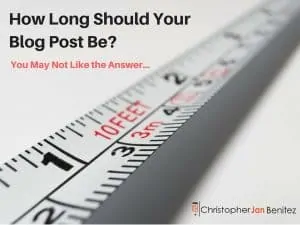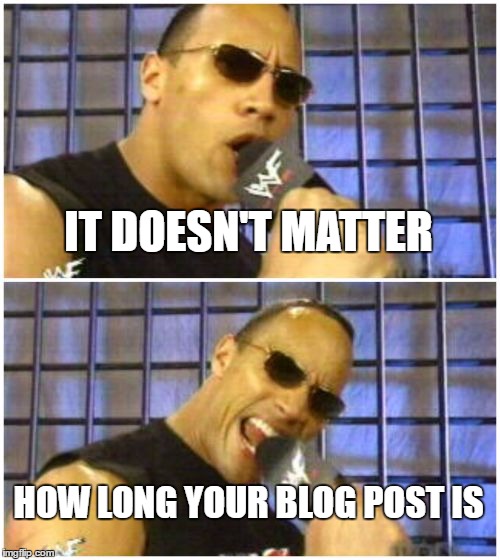Last Updated on 1 year by Christopher Jan Benitez
Much has been said about the ideal blog post length.
From an SEO standpoint, the more words in your blog post, the more times you may mention your target keyword, which is one of the many factors that determine the search ranking of your pages.
Longer posts mean better regarding blog post length, right?
WRONG.
In a study by the Norman Nielsen Group, your readers do not read your content.
Instead, they scan your article and pick out phrases and words to read and process.
You can even say that shorter posts are even better than long ones.
Consider this latest post from Seth Godin‘s blog.

Of course, comparing yourself to a marketing maven is not fair. Despite his authority, you cannot deny that short posts have their place in your blog.
Think about it – when the last time you read a 2,000-word content word for word without having to stop and do something else was? Chances are, your short attention span would prefer reading a short article that packs a punch like Seth’s.
But the question still begs to be answered:
How Long Should Blog Posts Be?
My answer to this question may offend some.
My answer is not borne out of spite or ill will toward my readers. It is simply a cold, hard fact that you need to understand when approaching how you write for your blog.
In other words:
So what is important then?
While blog post length does not matter, what matters is your intention for writing your post.
Instead of asking yourself how long your blog post should be, you should answer this question yourself?
Why am I writing this blog post?
Are you writing your blog post because you want to:
- Rank on top of search engines?
- Sell something?
- Engage with your audience?
- Drive more subscribers to your mailing list?
- Grow your social media followers?
- encourage them to download your freemium product (e-book, whitepaper, etc.)?
If so, instead of focusing on word count, why don’t you concentrate on writing your post in an attempt to meet your goal instead?
If you can write short posts that pack a punch, then that should be enough
If you need to write long posts to explain your point, then more power to you.
It would help if you could make your posts longer to increase your chances of ranking on search results. At the same time, it would be nice to have posts like Seth Godin’s that are short but gather hundreds of social shares.
The point is to prioritize what you want and have to say, regardless of how many or few words it takes, keeping your goal in mind.
Nonetheless, the question remains:
What’s the Optimal Blog Post Length?
We’ve already established that blog post length is subjective and depends on the post’s intention.
Still, you don’t want to make the mistake of writing long-form blog posts when the topics call for shorter blog posts.
That’s why knowing the perfect blog post length is crucial to help you write a blog article that’s neither too short nor long.
The reason is because of search engine optimization (SEO).
By writing the right blog length for your post, you can increase its chances of ranking on top of search results for your target keyword.
A big part of this is search intent.
This refers to what the objectives of users when searching for a query on Google and other search engines.
When you write blog posts, you want to answer the users’ questions about the topic.
Covering all the bases and providing value to users with your blog posts helps you rank higher on organic search.
There are four intent types you need to be wary of:

It’s in Google’s best interest to provide users with the best pages on search results.
At the same time, you don’t want to cover more than the required bases when writing your content.
As mentioned, writing in-depth and long-form content for a keyword with a search intent requiring a short answer won’t fly with Google nowadays.
So, creating content in line with the keyword’s intent allows you to get in the good graces of Google, leading to higher search engine results.
If your blog articles rank at the very top of Google search for their keywords, you generate more website traffic.
From here, you can achieve your goals and objectives for your blog content.
Finding the Average Blog Post Length for Your Topic
Going back to how many words your content needs, you must come up with a way to determine your post’s word length.
In my experience, I use a tool like Surfer SEO to help me figure things out.
I used SERP Analyzer to help get in-depth with my research.
Enter the keyword/s that you want to optimize your content on the search bar.

The results page tells you the average word count of the top-ranking pages for the search query.
Initially, the tool groups together batches of ten to determine the average post length.
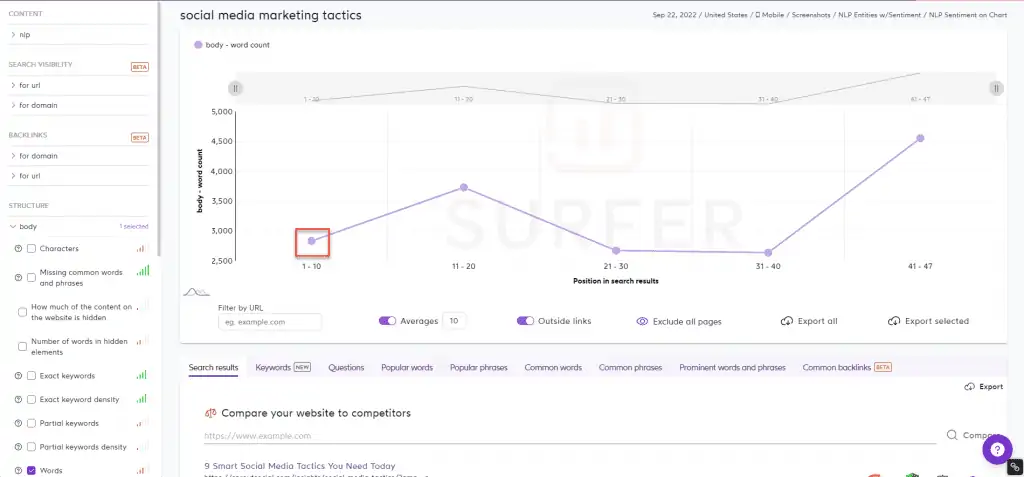
Since each page on Google search has ten results, you want to stick to the average post length shown on the graph’s first dot.
Following the default average word count should be good enough to help you write high-quality content optimized for your keyword.
However, the average word count may be skewed by a lengthy blog post in a sea of shorter ones or vice versa.
To know for sure, you want to investigate how long the posts are, you want to show the word count of each.
To do this, change the number from 10 to 1.
This changes the graph to show you the number of words each post has in graph format.
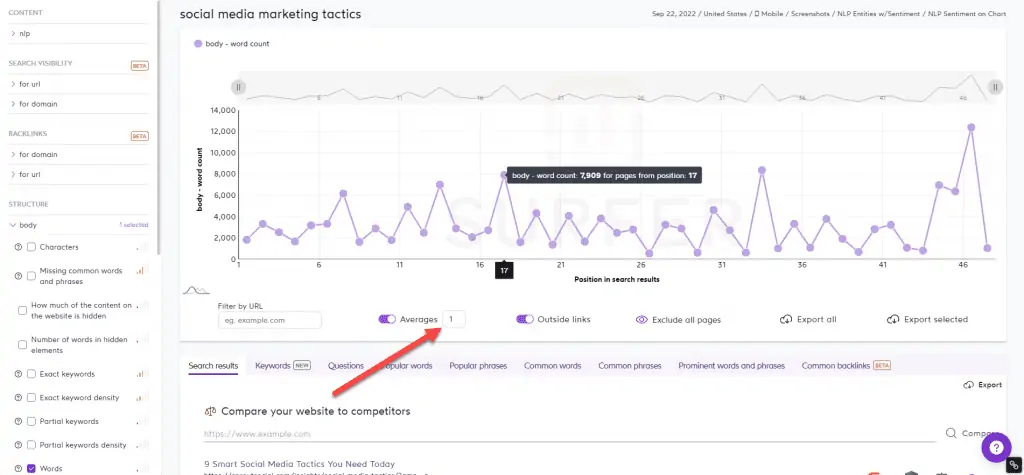
In this example, the seventh result for the keyword “social media marketing tactics” has over 6,000 words, which is a long blog post compared to the other ones in the first ten results (all of them barely reached 4,000 words).
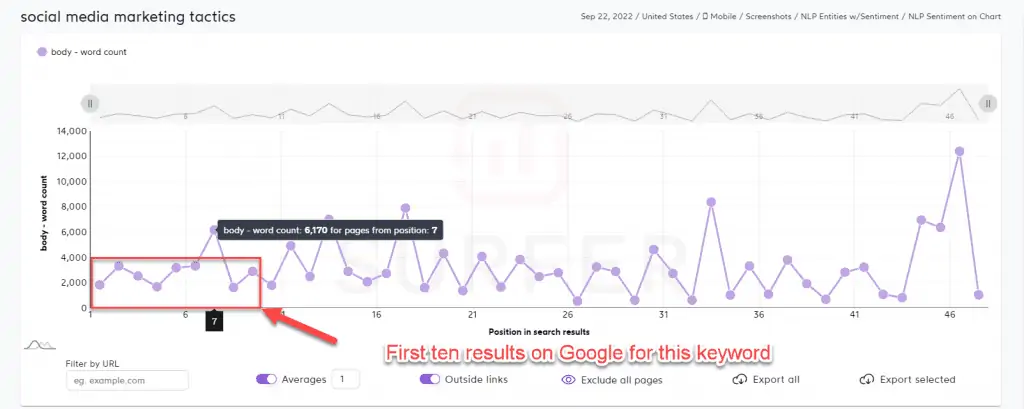
From here, you want to limit your blog post to not more than 4,000 words.
It’s still going to be a well-written long post aimed at your target audience (assuming you know how to write a good blog post) to be published on your amazon blog.
More importantly, it meets the ideal length that should help you rank on Google searches and attract organic search traffic over time.
Note:
Knowing how long should a blog post be is just one of the many factors you must know when trying to rank a page on organic search.
Also, consider and observe the best on-page SEO practices to increase your chance of showing up on Google search.
Ideal Blog Post Length: Wrapping Up
When writing, you should never worry about how long should your blog post be.
Longer blog posts may arguably provide readers with more information.
But if it’s not what your audience is looking for (based on the term’s intent), it won’t rank!
The only thing that should matter is how you can achieve the goal you have set for writing your post.
Hopefully, the information and suggestions below should help you make better posts for your blog audience, regardless of word count.
Thoughts to ponder: What other things should bloggers concern themselves with aside from blog post length and their goal for writing one?

